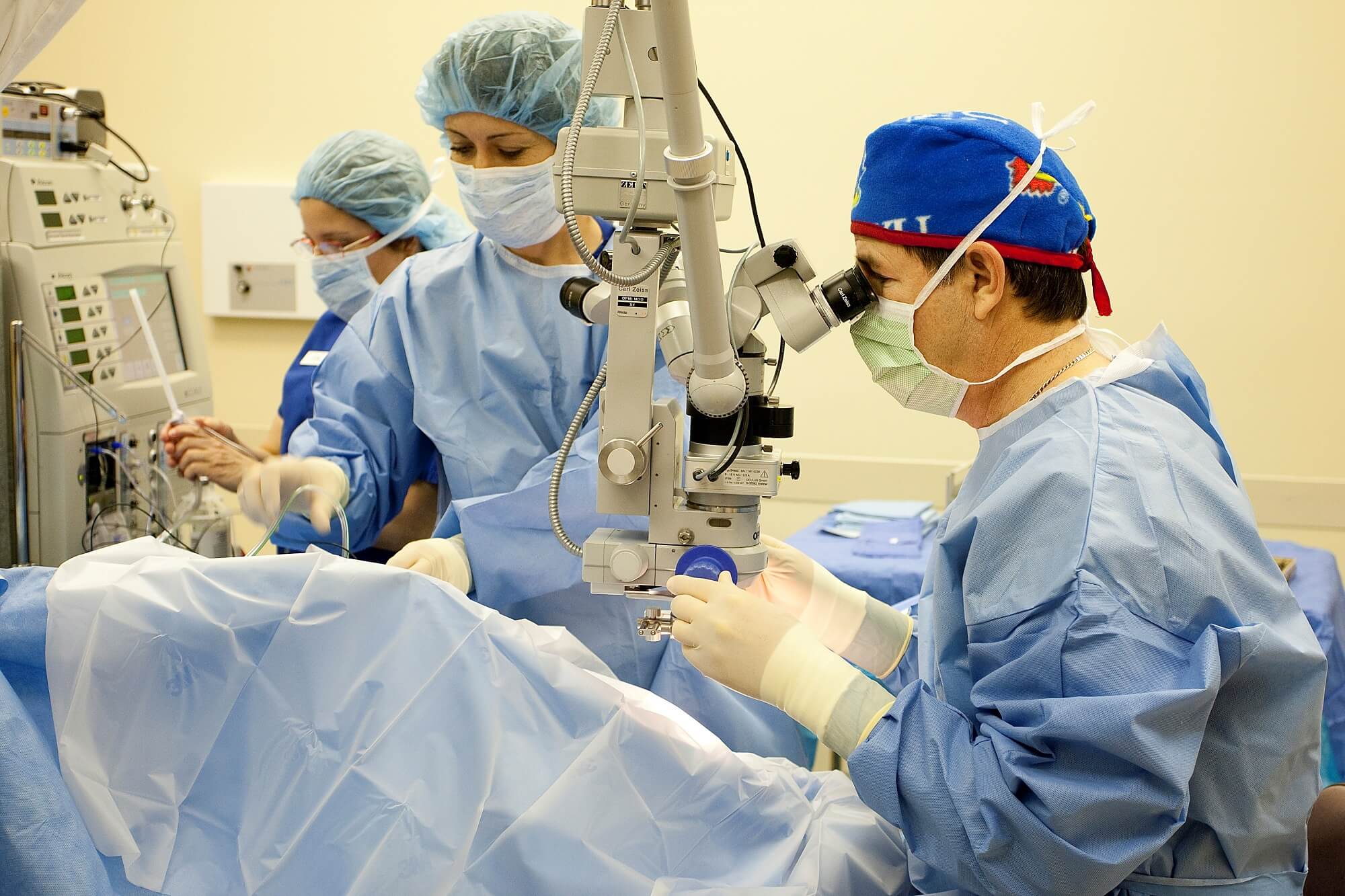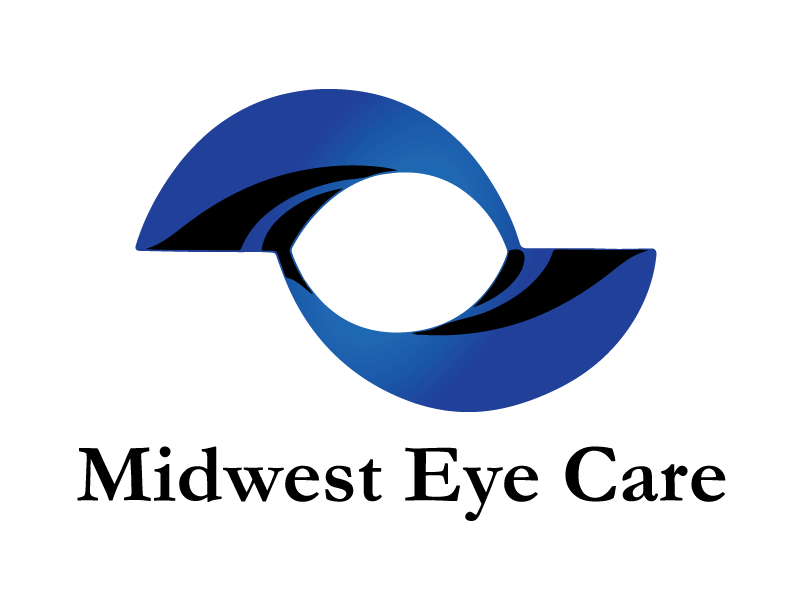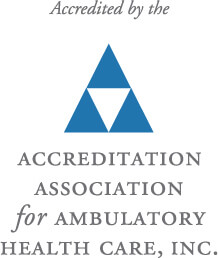
The Midwest Eye Care physicians support and perform eye surgery at hospitals in the metropolitan area and in smaller communities in Iowa and Nebraska. In addition to these fine hospitals, our physicians also perform surgery at the Midwest Eye Surgery Center (MESC).
MESC is located on the lower level of the Midwest Eye Care building at 4353 Dodge Street in Omaha. This ambulatory surgery center, certified by Medicare, Medicaid and the Accreditation Association of Ambulatory Health Care (AAAHC), provides the highest quality of care by focusing only on eye surgery.
This facility was originally operated by Nebraska Medical Center from 1991 to 2000 and was certified by the Joint Commission on Accreditation of Healthcare Organizations, the same organization that accredits the majority of hospitals in the United States. In 2002, MESC was accredited by AAAHC for a three-year period, the longest accreditation period available. MESC was re-accredited by AAAHC in 2005, 2008, 2011, 2014, 2017, and 2020 for an additional three-year period.
MESC is able to offer convenient surgical services to its patients through a number of innovations, including:
- Advising your family physician to perform an abbreviated pre-operative history and physical exam that focuses on the limited risks of eye surgery;
- Expediting the check-in and check-out procedures generates a much shorter stay at our facility on the day of surgery.
- Utilizing a certified nurse anesthetist who provides anesthesia for over 2,000 eye surgeries each year and uniquely understands how to provide appropriate medication for eye surgery.
- Relying on registered nurses and operating room technicians who have decades of experience and are dedicated to providing care to eye surgery patients.
We are also continually striving to improve our care. We distribute patient satisfaction surveys to 100% of our patients, and our quality assurance committee of physicians, nurses and anesthetists meets regularly to identify potential improvements.
Preparing for surgery
To help you prepare for surgery, we have prepared a brochure that summarizes what you need to know about surgery day, and what you’ll need to do before and after surgery. A paper copy of this brochure is provided to every patient who elects to have surgery, and our doctors and staff will answer any questions you have regarding your surgical experience.
The cataract surgery experience
Cataract surgery is one of the most frequently performed surgical procedures in the United States, and it is the most common surgery for Medicare recipients. Virtually everyone needs cataract surgery if they live out their natural lives, and cataract surgery techniques and equipment have improved dramatically over the past forty years. In the 1960’s, cataract surgery was a lengthy procedure, and post-operative patients were required to lay still (with their head surrounded by sandbags) for at least 24 hours. In addition, although cataract extraction was first performed in the 1700’s and further refined in the mid-1900’s, intraocular lenses were not commonly inserted until the 1970’s. Without a replacement lens, patients were required to wear ‘pop-bottle’ glasses to see well after cataract surgery.
Today cataract surgery, while still not considered routine, is one of the safest surgeries in the world. Our highly trained physicians, armed with the state-of-the art equipment, will provide excellent care.
Diagnosing a cataract
As you age, the proteins in the lens of your eye begin to deteriorate, leading to a clouding of your lens. The progression of a cataract is generally slow, so you may have a cataract for several years before it causes enough visual distortion to warrant removal. Your eye doctor can easily identify a cataract through a microscope called a slit lamp, but some cataracts can even be seen clearly with the naked eye. Once a cataract has progressed enough to reduce your quality of life, our physician will recommend surgery.
Pre-operative tests
Cataract surgery entails removing the cloudy, natural lens from the eye and replacing it with a synthetic lens. In order to determine the power and type of lens to implant, a test technician at Midwest Eye Care will perform a few tests that should be completed in less than thirty minutes. These tests will either be performed on the day of the exam or in the days leading up to surgery.
Pre-operative history and physical exam
Because cataract surgery requires mild sedation to anesthetize the eye and mask any slight pain you might otherwise feel, we ask each patient to visit their family physician before surgery to ensure the patient is ‘fit for surgery.’ The great majority of patients will tolerate surgery without any problems, but there are patients with lung or heart disease, advanced diabetes or conditions that require more precautions and preparation prior to surgery. Your family physician is the best person to advise us of these conditions, and this requirement often helps patients make a long-overdue visit to their family physician.
The day before surgery
Surgical patients will be asked to stop eating or drinking after midnight if their surgery is scheduled before 1:00 p.m. Surgical patients scheduled 1:00 p.m. or later are allowed to have a light meal up to 5:00 a.m. In terms of medications, our surgical scheduler will provide guidance on which medications should or should not be taken on surgery day.
Check-in on surgery day
Although requirements will vary by facility, at Midwest Eye Surgery Center you will be asked to report sixty minutes before your scheduled surgery time. You should plan on bringing a friend or family member who can drive you home after surgery, because one eye will be patched and the effects of sedation may linger for several hours after surgery.
After you check in, you will be asked to complete a few brief registration worksheets before you are escorted back to the dressing room. Patients are asked to trade their shirt for a dressing gown; patients continue to wear their pants, so we suggest you wear loose-fitting pants that will be comfortable whether you are sitting or laying down.
A nurse will complete a pre-operative clinical review of your condition, overall health history and when to report for your post-operative exam if necessary. After registering your vital signs, the anesthetist will meet with you to assess the need to administer a mild sedative to help you relax. Patients are seated in a specialized eye chair that transitions to a bed when ready to when ready to move into the operating room. The physician will numb your eye before you enter the operative room.
The operating room
You will be transported to the operating room and positioned under the operating microscope and light. Although the light will be bright, it won’t be bothersome because of the combination of the sedative, the numbing drops in the operated eye and a paper drape over your non-operated eye. Relaxing music will be playing in the background, and you’ll be able to hear the voices of the surgeon, nurses and anesthetist. The physician and the anesthetist will speak with you several times during the procedure to make sure you are comfortable, but they will ask you to refrain from speaking at other times to limit your eye movement. After the procedure is completed, you will be wheeled back to a recovery station.
Recovery
Immediately after surgery, a nurse will measure your vital signs. The nurse will provide you and your escort with instructions on medications, bathing and when to report for your post-operative exam. After the nurse has ensured that the patients are stable. Most patients are discharged within twenty to thirty minutes after surgery.
Surgeons
The following doctors are credentialed to perform eye surgery at Midwest Eye Surgery Center. All of these doctors are board certified by the American Board of Ophthalmology.
- Matthew Appenzeller, MD
- Mark Emig, MD
- Michael Feilmeier, MD
- Jill Grennan, MD
- Jesse Himebaugh, MD
- David Ingvoldstad, MD
- Rachel Mercer, MD
- Martin Mizener, MD
- Bliss E.O’Bryhim, MD, PhD
- Madeline D. Ripa, MD
Physician ownership disclosure
Midwest Eye Surgery Center is owned by eight ophthalmologists at Midwest Eye Care. The following physicians have a financial interest/ownership in MESC: Matthew Appenzeller, M.D., Mark Emig, M.D., Michael Feilmeier, M.D., Jesse Himebaugh, M.D., David Ingvoldstad, M.D., Rachel Mercer, M.D. and Martin Mizener, M.D.. You have the right to choose the provider and facility for your health care services. You will not be treated differently by your physician if you elect to obtain health care services at another facility.


